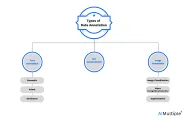Data Compliance in 2024: Best Practices & Challenges
Data plays a crucial role in the daily operations of organizations. With more data being collected and processed than ever, protecting sensitive information and following relevant data security rules are essential. Data compliance is important not only for legal reasons but also for managing insider threats and maintaining a strong customer reputation.
This article offers an overview of data compliance, helping organizations make sense of the different rules and standards that apply to them. By understanding data protection laws and best practices, businesses can better safeguard their data and foster customer trust.
What is data compliance?
Data compliance refers to the adherence to an organization’s:
- data management
- storage
- sharing
- usage practices to the relevant laws, regulations, and industry standards.
This is essential in ensuring data security, privacy, and integrity, as well as minimizing legal and financial risks. Compliance involves implementing policies, procedures, and systems that help organizations protect:
- sensitive information
- comply with privacy regulations
- maintain proper data retention and disposal processes.
Why is data compliance important?
1-Legal and regulatory requirements
Failing to comply with data protection and privacy laws can lead to hefty fines, penalties, and legal repercussions. Organizations must adhere to these regulations to avoid negative consequences and maintain a positive reputation in the marketplace.
2-Data security
Effective data compliance practices help organizations safeguard sensitive information from unauthorized access, disclosure, alteration, or destruction and achieve robust data security. This protects valuable assets and minimizes the risk of data breaches, which can have high financial and reputational costs.
3-Consumer trust and privacy
In today’s digital age, consumers are increasingly concerned about their personal data and how it is being used. Compliance with data protection regulations ensures that organizations respect consumer privacy and handle their data carefully, which fosters trust and loyalty.
4-Competitive advantage
Organizations prioritizing data compliance demonstrate a strong commitment to data security and privacy. This can differentiate them from competitors and attract customers who value responsible data practices.
5-Operational efficiency
Implementing robust data compliance policies and procedures can help organizations streamline their data management processes, identify potential issues early, and mitigate risks more effectively.
What are the data compliance standards and regulations?
Some of the most well-known and widely applicable standards and regulations include:
1-General Data Protection Regulation (GDPR)
GDPR is a comprehensive data protection regulation enforced in the European Union that aims to safeguard EU citizens’ privacy by regulating how organizations collect, process, store, and share personal data. (See Figure 1)
Source: Emotiv1
Figure 1: GDPR Overlook
2-California Consumer Privacy Act (CCPA)
CCPA is a privacy law in the United States that applies to California businesses. It grants California residents rights over personal data and imposes obligations on businesses to protect consumers’ privacy.
3-Health Insurance Portability and Accountability Act (HIPAA)
HIPAA is a U.S. law that sets standards for protecting sensitive patient health information, primarily affecting healthcare providers, health plans, and clearinghouses. (See Figure 2)
Source: Dreamstime2
Figure 2: Diagram of Health Insurance Portability and Accountability Act
4-Payment Card Industry Data Security Standard (PCI DSS)
PCI DSS is a set of security standards designed to ensure that all organizations accept, process, store, or transmit credit card information to maintain a secure environment, protecting businesses and cardholders from potential data breaches. (See Figure 3)
Source: Impreva3
Figure 3: PCI DSS Certification
5-International Organization for Standardization (ISO) 27001
ISO is a globally recognized standard for information security management systems (ISMS) that systematically manages sensitive company information, ensuring its confidentiality, integrity, and availability.
6-Federal Information Security Management Act (FISMA)
FISMA is a United States law that mandates federal agencies to implement information security programs to protect their information and information systems.
Top 3 challenges in data compliance
- Evolving regulations: Data protection laws, such as GDPR (Europe), CCPA (California), and LGPD (Brazil), are constantly evolving. Organizations must stay up-to-date with these changes to remain compliant.
- Different country regulations: With different data protection regulations in various countries, organizations operating internationally need to understand and adhere to the unique compliance requirements of each jurisdiction.
- Data discovery and classification: Organizations must identify and classify personal data stored across their systems. This can be time-consuming and complex, particularly for large companies with vast amounts of data.
How to ensure data compliance?
1-Understand applicable regulations
Research and identify the specific data protection and privacy regulations relevant to your organization’s industry, operations, and geographical locations.
2-Develop a data compliance policy
Create a clear and concise policy that outlines your organization’s approach to data protection, privacy, and compliance. This policy should include data collection, processing, storage, sharing, retention, and disposal guidelines.
Continuously reviewing and updating your organization’s data compliance policies and procedures in response to changes in regulations, industry standards, or organizational needs is also part of a robust data compliance policy.
3-Conduct risk assessments
Perform regular assessments to identify potential risks to data security and privacy. This process will help you prioritize the necessary controls and measures to mitigate risks effectively.
4-Implement strong data security measures
Use encryption, access controls, firewalls, and other security technologies to protect sensitive data from unauthorized access, disclosure, alteration, or destruction. Conduct routine audits to ensure your organization follows its data compliance policies and maintains data security. Implement monitoring tools to detect any potential breaches or non-compliant activities.
Develop a plan to address potential data breaches, including immediate containment, investigation, notification of affected individuals and authorities, and remediation to prevent future breaches.
5-Train employees
Provide ongoing training to employees to understand data protection regulations, the organization’s data compliance policy, and their responsibilities when handling sensitive data.
Create a compliance team responsible for overseeing the organization’s data protection practices, ensuring compliance with relevant regulations, and addressing data-related concerns.
6-Maintain documentation
Keep detailed records of data processing activities, risk assessments, and implement security measures to demonstrate compliance in case of audits or investigations.
If you have further questions, reach us:
External Links
- 1. Emotiv, GDPR Overlook
- 2. Dreamstime, Health Insurance Portability and Accountability Act
- 3. Impreva, PCI DSS Certification



Comments
Your email address will not be published. All fields are required.